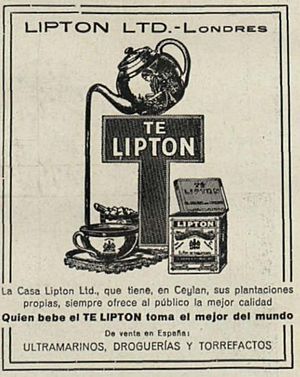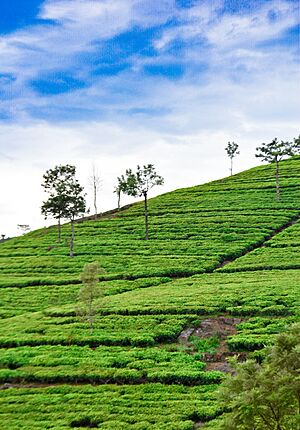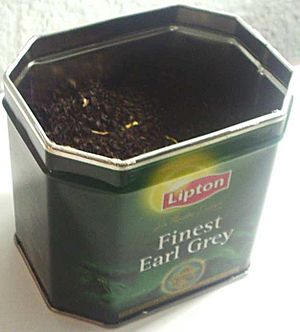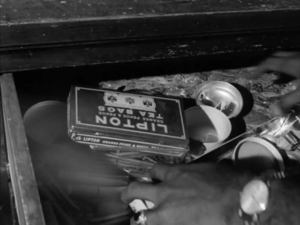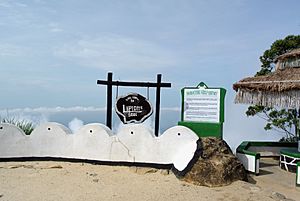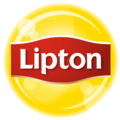Lipton facts for kids
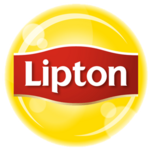 |
|
| Product type | Tea |
|---|---|
| Owner | Ekaterra |
| Country | UK |
| Introduced | 1890 |
| Markets | Worldwide |
| Previous owners | Argyll Foods (stores) Unilever |
Lipton is a famous British brand known for its tea. It is currently owned by a company called Ekaterra. Lipton was also a chain of grocery stores in the United Kingdom for a while.
The company is named after its founder, Sir Thomas Lipton, who started it in 1890. You might also know Lipton for its ready-to-drink teas, like bottled iced tea. These are sold by "Pepsi Lipton International," a company that is partly owned by Unilever and PepsiCo.
Contents
The Story of Lipton Tea
How Lipton Started
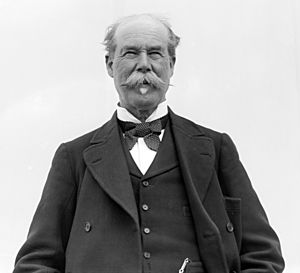
The story of Lipton began in 1871. A man named Thomas Lipton (1848–1931) from Glasgow, Scotland, used his small savings to open his own shop. He worked hard, and by the 1880s, his business had grown to more than 200 shops!
At first, Lipton's was a grocery store chain. Later, in the 1980s, these stores changed their name to Presto. But the Lipton name became most famous for tea.
Growing the Tea Business
Soon after opening his first shop, Thomas Lipton started traveling the world. He was looking for new and exciting products to sell. One of these products was tea, which was quite rare and expensive back then.
In 1890, Thomas Lipton bought tea gardens in Ceylon, which is now called Sri Lanka. He found ways to package and ship his tea at a low cost. He then sold his tea in packets with a simple but powerful slogan: "Direct from the tea gardens to the teapot." Lipton teas quickly became very popular, especially in the United States.
Over time, the Lipton tea business was bought by a large company called Unilever. This happened in different steps, starting in 1938 and finishing in 1972.
In 1991, Unilever teamed up with PepsiCo to create a special company called Pepsi Lipton Partnership. This company sells ready-to-drink (bottled and canned) teas in North America. Later, in 2003, they created another company, Pepsi-Lipton International (PLI), to sell these teas in many other countries around the world.
In 2011, an animal rights group called PETA raised concerns about animal testing. Unilever, the owner of Lipton at the time, decided to stop testing Lipton products on animals. They only do it now if a government requires it for safety reasons.
Lipton Soup Mixes
Lipton also makes instant soup mixes. In the 1950s, Lipton helped make "French onion dip" very popular in the United States. This dip was made at home using Lipton's French onion soup mix.
Lipton Today
Lipton teas are a blend of teas from many different places. These include countries like Sri Lanka, India, Kenya, and China. For example, Lipton Yellow Label tea is made from about 20 different types of tea!
Besides the classic black tea (like Lipton Yellow Label), the company sells many other kinds. These include green teas, flavored black teas, and herbal teas.
Lipton still owns tea plantations in East Africa, in places like Kenya and Tanzania. In 2007, Unilever (Lipton's parent company at the time) promised to get all its tea in a way that helps the environment. They worked with the Rainforest Alliance, a group that protects nature. This means that Lipton tea bags sold around the world are now certified by the Rainforest Alliance. This shows that the tea is grown in a way that is good for the planet and the people who grow it.
Lipton Tea Products
Lipton's most well-known products are Lipton Yellow Label tea and Lipton Iced Tea.
Lipton Yellow Label
Lipton Yellow Label tea has been sold since 1890. It was the first tea Thomas Lipton introduced. You can find it in 150 countries around the world. It's a mix of different teas, sold in both tea bags and as loose tea leaves.
Lipton Iced Tea
Lipton Iced Tea (or Lipton Ice Tea) comes in many flavors. Some popular ones are lemon, peach, mango, and raspberry. In some places, you can also find green tea and rooibos flavors.
Brisk Tea
Brisk, which used to be called Lipton Brisk, is another iced tea brand. It's mainly sold in North America. Brisk has a special sharp flavor because it has an ingredient called phosphoric acid.
Lipton Pyramid Tea
Lipton also makes tea in pyramid-shaped tea bags. These bags allow the tea leaves more room to move around and release their flavor. Some flavors include Earl Grey, English Breakfast, and Green Tea Mandarin Orange.
Pure Leaf Tea
Pure Leaf is an iced tea brand sold mostly in North and South America. Unlike some other Lipton iced teas that use instant tea powder, Pure Leaf is made from real brewed tea. It comes in square bottles that can be recycled.
Lipton Around the World
Lipton tea is sold in over 110 countries. It's very popular in Europe, North America, Africa, the Middle East, parts of Asia, Australia, New Zealand, Latin America, and the Caribbean. Even though Lipton started in Britain, you won't find Lipton black tea (like Yellow Label) sold there. This is because Ekaterra, the company that owns Lipton, sells another tea brand called PG Tips in the UK. However, Lipton Ice Tea and fruit teas are available in the UK.
Marketing and Advertising
In 1914, Lipton tea was one of the sponsors for the first flight from Melbourne to Sydney in Australia. This was a very long flight for air mail and cargo at the time!
Lipton has also done fun advertising campaigns. In 2010, in the United Kingdom, Lipton gave out many free samples of Lipton Ice Tea. Their slogan was "Don't knock it 'til you’ve tried it!" This helped many people discover they liked the taste. Lipton also made commercials with The Muppets for their 2014 movie Muppets Most Wanted.
Lipton's Seat
"Lipton's Seat" is a high viewpoint in the hills of Sri Lanka. It's close to the Dambatenne Tea Factory, which was one of Thomas Lipton's first tea plantations. To reach Lipton's Seat, you climb about 8 kilometers (5 miles) through beautiful green tea fields. From the top, you can see amazing views of the surrounding provinces, like a giant map spread out below you.
Images for kids
See also
 In Spanish: Lipton para niños
In Spanish: Lipton para niños
 | Audre Lorde |
 | John Berry Meachum |
 | Ferdinand Lee Barnett |


